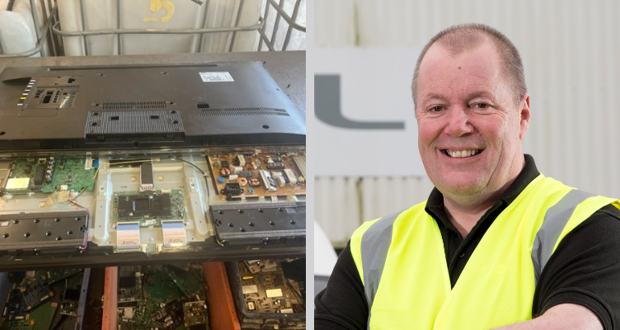17 August 2023

By Bruce McLean, Managing Director Optimum Eco Group
As head of Scotland’s leading electronic recycling group, I am delighted to bring you some exciting news. At Optimum Eco Group, our specialist companies are not only committed to reusing and recycling electronic and electrical equipment, but also dedicated to developing innovative solutions that put sustainability at the heart of our process whilst protecting the environment.
I’m proud to be able to introduce our world-leading app, designed to trace Persistent Organic Pollutants (POPs) in televisions and other electrical items. Let's explore the incredible journey behind this development and how our company is revolutionising sustainable practices.
In late 2019, our industry faced a significant challenge. Just hours before our team members were about to embark on their Christmas holidays, we received an important email from our environmental agency SEPA, prohibiting the recycling of plastic casings, necessitating their irreversible destruction through incineration.
For those of you unaware of what the term POPs means, this refers to Persistent Organic Pollutants. These are a group of highly toxic chemical substances that are resistant to environmental degradation. To prevent televisions and other appliances from catching fire, some manufacturers incorporated (POPs) flame retardants into their plastic casings. However, this unintentionally created another longer-term environmental concern.
This notification posed a real problem for us. It meant we could no longer recycle these plastics as we had no way of testing if they contained POPs. It also had financial implications as recycling these plastics was making us a revenue of around £100,000 per year, and having to destroy them would now cost us around £100,000 per year. We were determined to find a solution not just for the business, but to ensure the plastic was not going to be wasted and that recycling could be an option again.
Driven by our unwavering commitment to finding a solution, we embarked on a journey to establish an accurate and robust testing capability for identifying POPs in plastics and other materials. Over the proceeding years, we have developed an impressive testing process within our own laboratory, enabling us to precisely determine whether a product contains these harmful substances. To our great satisfaction, we created an app that guarantees complete accuracy in identifying the level of POPs on any product that still has the manufacturer's label or, at the very least, a part number.
Remarkably, our extensive testing has revealed that only 28 percent of the televisions we recycle actually contain POPs, meaning the remaining 72 percent can be safely reused and traded. This breakthrough not only saves significant resources, promoting a sustainable circular economy and keeping products in use but also ensures additional revenue.
Through accurate identification and segregation of materials with POPs from those without, we can continue to promote safe reuse. This innovative approach provides an unparalleled level of testing, while significantly reducing the unnecessary incineration of perfectly reusable plastics.
As Scotland moves toward new legislation that broadens the scope of regulations to include various products, such as sofas and furniture, our app arrives at a critical juncture. Resale of second-hand items containing POPs may soon be prohibited, reinforcing the importance of accurate identification and informed decision-making. Our app, developed over several years, will undoubtedly prove to be a game-changer in this regard, offering an intuitive user experience and reliable results.
I take great pride in our achievements and hope we can empower individuals and businesses to make informed decisions regarding the presence of POPs in products. By leveraging our app's capabilities, we can promote sustainable practices across various industries, reducing waste and protecting our environment.